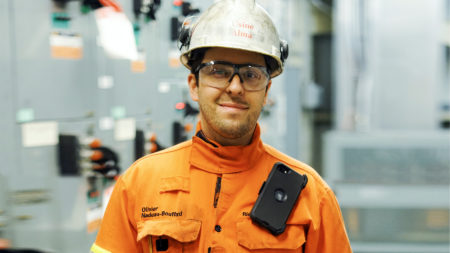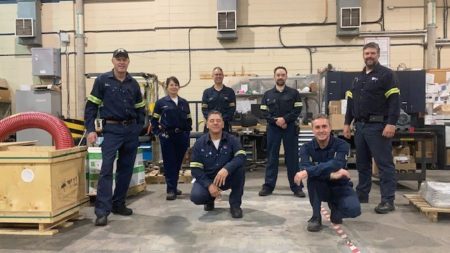Job: Supervisor at Network Control Centre

Definition of the position of supervisor at Network Control Centre: Management employee in charge of distribution for the Rio Tinto hydropower network at Saguenay–Lac-St-Jean.
Based in Alma, Jimmy Parent and Maxime Trépanier are both network supervisors for Power Operations. Here, they tell us about their critical role in the central nervous system of hydropower production and how their job requires sharp technical abilities to ensure public safety and oversee low-carbon aluminium production in the region.
First off, what are your responsibilities as network supervisor?
Jimmy: Broadly, we ensure that the hydropower network is distributed across all Rio Tinto facilities in the region. We need to find the right balance, which means distributing hydropower based on production levels. There are four main elements to our job: first, managing energy exchange with Hydro-Québec; second, making the final decision to release equipment that needs to be serviced during the day; third, participating in water management, which is essential for energy production and public safety; fourth, ensuring the overall management of the network in real time.
Maxime: I like to compare our job to that of an air traffic controller. We know everything that’s happening in the hydropower system, and it’s up to us to say when to land, when to react. It’s kind of like working in the “control tower” for our operations. The same way that firefighters make sure their firetruck is ready to respond to any emergency, we make sure that the network is ready to handle every situation. In addition to carrying out various technical tasks, we supervise the operators of the Power Operations Network Control Centre and the Isle-Maligne Power Station. Our role is therefore different than that of, say, maintenance supervisors because there’s an important technical component.
What does your average workday look like?
Jimmy: We work 12-hour shifts, 3-2-2, every other weekend. At shift change, we follow up on the day’s or night’s planning. For example, we check if there are any upcoming changes or equipment releases. We also monitor the network to anticipate potential outages or power interruptions. In addition to managing the operators, we need to constantly analyse and update the network status, as the situation could change in a matter of minutes!
Maxime: Our work is different every season. We play a crucial role in critical periods like the spring freshet. We help maintain direct and constant communication with partners. We also respond to emergency situations, which is why the Network Control Centre phone number is provided on many safety signs in hydropower facilities.

Power Operations facilities
What do you love about your current role?
Maxime: I love what I’m doing to optimize our use of water. The water flowing downstream has the potential to produce hydropower five times over as it passes through our various power stations. I like helping to produce the most megawatts with the least amount of water by making the right decisions. This allows us to produce green energy efficiently and minimise production costs at smelters.
Jimmy: I really appreciate the atmosphere and the way that the network team works together and with the technicians and engineers. We all work toward the same goal and use a problem-solving approach. Having shifts gives us a certain flexibility in our schedule. We organize everything together when planning our time off.
What makes you proud?
Maxime: In managing the network, we have a considerable decision-making role in the company. Alignments are sometimes necessary, but we have the final say because we’re at the end of the decision chain. I have an important responsibility, and I’m proud that I’m trusted with it.
Jimmy: Same thing for me: I’m proud of having a critical position. A single decision, insignificant as it may seem, can have a major impact. I’m also proud of being involved in the production of responsible aluminium.
What qualities are needed to succeed at the Network Control Centre?
Jimmy: You need to be able to manage stress well and learn on your own because there’s a lot you need to know. It’s important to be thorough and to have good analytical skills, as nothing can be left to chance.
Maxime: I agree with Jimmy that you need good analytical skills. Being methodical and orderly is also essential. When I come into the office, I continue my colleague’s work and vice versa. Everything must be clear.
Join our talent network by submitting your application online: https://jobs.riotinto.com/


